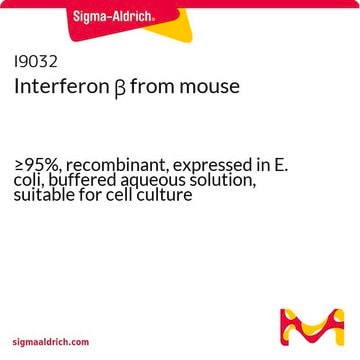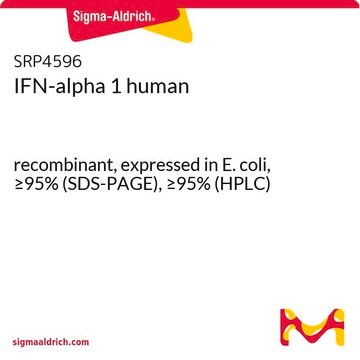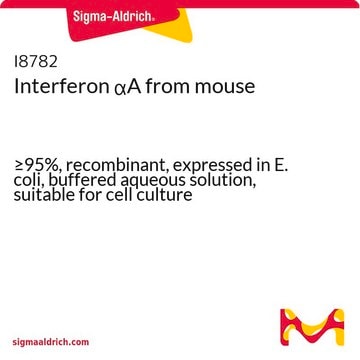I8657
Interferon α from rat
≥95%, recombinant, expressed in bacteria, lyophilized powder, suitable for cell culture
Synonym(s):
IFN-α
Sign Into View Organizational & Contract Pricing
All Photos(1)
About This Item
Recommended Products
biological source
rat
Quality Level
recombinant
expressed in bacteria
Assay
≥95%
form
lyophilized powder
mol wt
~19 kDa
packaging
pkg of 1 vial
concentration
300,000-800,000,000 units/mL
technique(s)
cell culture | mammalian: suitable
UniProt accession no.
shipped in
dry ice
storage temp.
−70°C
Gene Information
rat ... Ifna_mapped(24480)
General description
Interferon α is a cytokine, that belongs to type I interferon (IFNs) family. It possesses 14 genes, including 2 pseudo-genes or allelic forms that encodes for 13 proteins. It is mainly induced in response to viral infection. It is a non-leukemogenic peptide.
Biochem/physiol Actions
Cytokine with anti-viral, anti-proliferative, immunoregulatory, and proinflammatory activities. Type I Interferons are a closely related family of 165-172 amino acid proteins that are produced by leukocytes (α subtypes), fibroblasts (β subtypes), lymphocytes (ω subtypes) and ruminant embryos (τ subtypes). Interferon induces a variety of effects on target cells including antiviral, antiproliferative and immunomodulatory activities.
Interferon α play a key role in the inhibition of in vitro proliferation of hematopoietic progenitors. It mediates the regulation of gene expression that is responsible for development and functionality of innate and adaptive immunity. It has been used as myelosuppressive agent for myeloproliferative neoplasms (MPNs).
Physical form
Lyophilized from a solution containing citric acid buffered saline (CBS pH 5.0) and 125 mM trehalose
Analysis Note
The biological activity is determined in the cytopathic effect inhibition assay using rat epithelial-like (RATEC) cells with vesicular stomatitis virus (VSV) in the presence of 2mM glutathione. The cytopathic effect of 50% is produced with ~1 unit/mL interferon. Since there is no international rat interferon α standard, units are determined with respect to the NIH international standard reference for mouse interferon α/β.
Storage Class Code
11 - Combustible Solids
WGK
WGK 3
Flash Point(F)
Not applicable
Flash Point(C)
Not applicable
Certificates of Analysis (COA)
Search for Certificates of Analysis (COA) by entering the products Lot/Batch Number. Lot and Batch Numbers can be found on a product’s label following the words ‘Lot’ or ‘Batch’.
Already Own This Product?
Find documentation for the products that you have recently purchased in the Document Library.
Agnieszka Rynda et al.
PloS one, 5(1), e8720-e8720 (2010-01-22)
Conventional methods to induce tolerance in humans have met with limited success. Hence, efforts to redirect tolerogen uptake using reovirus adhesin, protein sigma 1 (psigma1), may circumvent these shortcomings based upon the recent finding that when reovirus psigma1 is engineered
The interferon system of teleost fish
Robertsen B
Fish & Shellfish Immunology, 20(2), 172-191 (2006)
Jie-Hyun Kim et al.
Yonsei medical journal, 47(6), 793-798 (2006-12-28)
Combination therapy with interferon alpha (IFN-alpha) and ribavirin for 24 or 48 weeks according to HCV genotype has improved the overall sustained virological response (SVR) rates to approximately 40%. The aim of this study was to investigate the long-term efficacy
Jin Zhao et al.
PloS one, 8(5), e64301-e64301 (2013-06-07)
The cytokine interleukin-28B (IL-28B) has potential antiviral properties and regulatory roles in adaptive cellular immunity. A genome-wide association study identified a single nucleotide polymorphism near the IL-28B gene that strongly predicts response to hepatitis C treatment with interferon and ribavirin.
Interferon- ? therapy in bcr-abl-negative myeloproliferative neoplasms
Kiladjian JJ, et al.
Leukemia, 22(11), 1990-1990 (2008)
Our team of scientists has experience in all areas of research including Life Science, Material Science, Chemical Synthesis, Chromatography, Analytical and many others.
Contact Technical Service







